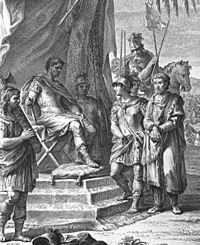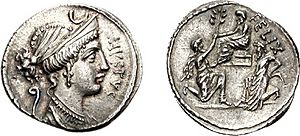Jugurtha facts for kids
Quick facts for kids Jugurtha |
|
|---|---|

King Jugurtha (in chains) captured by the Romans
|
|
| Reign | 118–105 BC |
| Predecessor | Micipsa |
| Successor | Gauda |
| Born | c. 160 BC Numidia |
| Died | c. 104 BC Rome |
| Issue | Oxyntas |
| Father | Mastanabal |
Jugurtha (born around 160 BC, died 104 BC) was a powerful king of Numidia. Numidia was an ancient kingdom in North Africa. When King Micipsa of Numidia passed away in 118 BC, Jugurtha and his two adopted brothers, Hiempsal and Adherbal, became the new rulers.
Jugurtha wanted to rule all of Numidia. He arranged for Hiempsal to be killed. After a war between the brothers, Jugurtha also defeated and killed Adherbal in 112 BC.
The Roman Republic was not happy about Adherbal's death. People in Rome were also upset because Jugurtha seemed to be bribing Roman officials to get his way. This led to a big conflict called the Jugurthine War between Rome and Numidia. After many battles, Jugurtha was captured in 105 BC. He was later shown off in Rome during a victory parade for the Roman general Gaius Marius.
Contents
Understanding Jugurtha's Name
The name Jugurtha comes from the ancient language of the Berber people. It likely means "he exceeded them" or "he was greater than them." This name fits with the old naming traditions of the Berber tribes.
Numidia and Its History
Numidia was a region in North Africa. It covered parts of what we now call western Tunisia and eastern Algeria. The people living there were often called Berbers. They were semi-nomadic, meaning they moved from place to place.
A leader named Masinissa helped create the Numidian kingdom. He was the chief of the Massaesyli tribe. Masinissa supported Rome during the Second Punic War (206 BC). This war was against the Punics from Carthage. With Rome's help, Masinissa defeated a rival chief named Syphax in 203 BC.
Numidian horsemen were very skilled. Their cavalry tactics helped the Roman army improve. This played a big part in Rome's victory in the Second Punic War.
Masinissa died in 148 BC. His son, Micipsa, became king. Jugurtha was Micipsa's adopted son. He was also Masinissa's grandson. Jugurtha was very popular among the Numidians. Micipsa worried about Jugurtha's growing influence. So, he sent Jugurtha to Hispania (modern-day Spain). Jugurtha was to help the Roman general Scipio Aemilianus in a military campaign.
This trip helped Jugurtha make important friends in Rome. He learned that some Roman officials could be influenced by gifts. He famously said that Rome was "a city for sale and doomed to quick destruction, if it should find a buyer."
How Jugurtha Became King
When King Micipsa died in 118 BC, Jugurtha and Micipsa's two sons became joint rulers. These sons were Jugurtha's adopted brothers, Hiempsal and Adherbal.
Hiempsal and Jugurtha started arguing right away. Jugurtha had Hiempsal killed. This led to a war with Adherbal. After Jugurtha defeated Adherbal in battle, Adherbal went to Rome for help.
Roman officials tried to solve the problem. They divided Numidia into two parts, probably in 116 BC. Jugurtha received the western half. However, some people believed that Roman officials took bribes to favor Jugurtha. This made the agreement seem unfair.
War Against Rome

By 112 BC, Jugurtha started fighting Adherbal again. He trapped Adherbal in his capital city, Cirta. Roman citizens living in Cirta encouraged Adherbal to keep fighting. They expected help from Rome.
However, Roman troops were busy with another war at the time. The Roman Senate only sent people to talk to Jugurtha. Jugurtha delayed until he captured Cirta. His soldiers then killed many people in the city, including the Romans.
This act put Jugurtha in direct conflict with Rome. Rome sent troops to Numidia. But Jugurtha's army, with its fast cavalry, was hard for the Roman heavy soldiers to defeat.
After taking Cirta, Jugurtha offered a peace deal to the Roman commander. This deal was very favorable to Jugurtha. This again raised suspicions that Roman officials were taking bribes. A Roman leader named Gaius Memmius accused the commander of corruption. He also arranged for Jugurtha to come to Rome safely to give evidence.
But once Jugurtha was in Rome, another official stopped him from speaking. Jugurtha also made things worse for himself. He used his time in Rome to arrange for a cousin, Massiva, to be killed. Massiva was a possible rival for the Numidian throne. Public opinion in Rome turned against Jugurtha. So, he was once again at war with the Roman Republic.
The war continued for a long time. Roman generals struggled to achieve a clear victory against Jugurtha. In 110 BC, Jugurtha even forced a whole Roman army to surrender.
A new Roman commander, Quintus Caecilius Metellus Numidicus, won some battles in 109 BC. But Jugurtha still refused to give up. Metellus's assistant, Gaius Marius, went back to Rome. He was elected consul in 107 BC. Marius then returned to Numidia to take charge of the war. Jugurtha was good at guerrilla warfare, which made the war last longer.
Jugurtha had an alliance with his neighbor to the west, Mauretania. Its king, Bocchus I, was Jugurtha's father-in-law. At first, Bocchus stayed out of the war. But in 107 BC, he joined Jugurtha against Marius.
This alliance did not last long. In 105 BC, Marius sent his officer, Sulla, to Mauretania. Bocchus agreed to betray Jugurtha and hand him over to Sulla. In return, Bocchus would get more land in western Numidia. This ended the war.
Jugurtha was brought to Rome in chains. He was paraded through the streets during Marius's victory celebration. His royal clothes were taken off, and his earrings were ripped out. He died soon after. Jugurtha was survived by his son, Oxyntas.
See also
 In Spanish: Jugurta para niños
In Spanish: Jugurta para niños
- Battle of the Muthul
- Bomilcar (2nd century BC)
- Jugurtha Tableland
- Jugurthine War
- Sallust, De Bello Iugurthino
- Tacfarinas
 | Mary Eliza Mahoney |
 | Susie King Taylor |
 | Ida Gray |
 | Eliza Ann Grier |

